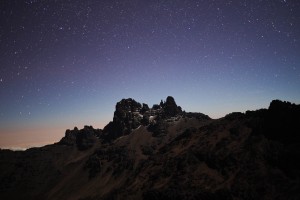They wanted to call themselves Team Simba, but I protested; it was so touristy. So they consented to “Team Tengeneza,” which means to create or make in Swahili. We were there to make a film, make a summit, make a difference.
Reuben, team captain, senior guide, is a sturdy and jovial mountaineer with the cheerful resilience of one who has been walking steep miles since he was a boy. His home is in the immense forest stretching out from Mt. Kenya, close to the town of Karatina, where his mother owns a tea farm and elders a Presbyterian church.
Like many guides on Mt. Kenya, Reuben went to Nairobi to attend the Kenya Utalii College for tourism and learned the trade by working as a safari guide in Kenya’s famous game parks. He then turned his eye back on the mountain that loomed over his childhood and began to explore both its slopes and its economy. First he was a porter, then a cook, and finally a junior guide for his uncle’s small trekking outfit. His eagerness and aptitude led him to apply and gain a scholarship to the National Outdoor Leadership School, a U.S.-based wilderness educator. He studied mountaineering in Washington state and wilderness medicine in Wyoming before returning to Kenya as a fully qualified guide. This unique opportunity made him of the most experienced mountaineers working on the mountain, and he began to lead trips not just to Mt. Kenya but to the mountains of Tanzania and Uganda as well.
Reuben has two small children, Eston and Nelius, with his wife Faith. They live in a small apartment behind the agro-vet that Faith operates during the day. Business on the mountain has been poor in recent years; whereas Reuben used to take as many as four trips to the mountain in a month, he has only led four trips this entire year to date. Thus, like every other guide, porter, or ranger that I met on the mountain, Reuben must have an additional and more reliable source of income. Like most, he owns and works a shamba, or farm. He specializes in onions.
The other porters, Peter, Timothy, and Humphrey, also told me they were farmer, although the others sniggered when Humphrey insisted upon this. It turns out he grows marijuana.
All the men are of the Kikuyu tribe, and for the days I was with them I grew accustomed to the soft rolling timbre of the Bantu language. Trust and friendship were obvious in the interminable laughter that rippled the cold night air around the chai boiling on an ancient kerosene stove.
Like Reuben, as boys these men hauled water up steep hills every morning and evening; now they haul luggage for up to ten hours a day. Reuben’s company outfits their employees better than most, but it’s not unusual to pass (or be passed by) porters with chairs, tables, crates of eggs, gas canisters or iron skillets strapped to the outside of their already bulging packs. Mt. Kenya is challenging terrain even with the lightest pack–the scree, the angle, the altitude–and I saw many porters (including my own) panting, coughing, and grimacing as they slogged upwards.
Team Tengeneza cheerfully put up with my constant videography; I filmed them walking, cooking, resting, chatting, and more. Reuben took me to his farm, introduced me to his family, and sat through longs interviews about working on the mountain. Filming a documentary is, I’ve learned already, mostly about relationship, getting people to be comfortable enough around you to just be themselves, to let you see life as it really is. This took time, and I had a number of other guides, porters, and clients tell me to shove off, but with patience I was gradually able to ask the questions I really wanted. Why do you work here? For the money? For the view? What do you think of the wealthy white tourists that give you work? What about the British alpinists who still operate as though the mountain is theirs?
Joy, resentment, humor, and truth slowly emerged from these men. My team learned to trust me and to let me sit with them around the kerosene stove. They have a hard life, but a good life, and I’m just beginning to understand it.






